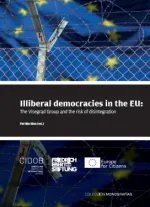Illiberal Democracies in the EU: the Visegrad Group and the Risk of Disintegration

Known as the Visegrad Group, or V4, the alliance of the Czech Republic, Hungary, Poland and Slovakia was formed in 1993, with all countries accessing the European Union nearly a decade later, in 2004. In recent years, these four countries have become an area of increasing political concern and analysis, as their leaders have moved towards a more Eurosceptic stance, widening the so-called east-west divide in the EU. The V4 countries, particularly Poland and Hungary, have largely shifted to self-described “illiberal democracies” that mark a turn away from political liberalism, with some countries consolidating extraordinary government prerogatives and limiting constitutional provisions that once nurtured an environment promoting the rule of law and a free and open society. These countries’ disillusionment over the handling of recent crises, most notably the refugee crisis, has created a backlash in which the V4 is challenging the decisions made in Brussels while at the same time still benefiting greatly from EU membership, particularly through structural and cohesion funds.
D.L.: B 3750-2017